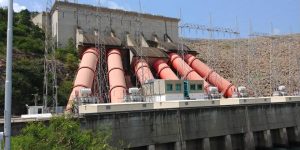The number of people listed as missing after the collapse of a 12-storey building in the US city of Miami has risen to 159, officials say.
Four people are known to have died.
The mayor of Miami-Dade says they “still have hope” of finding survivors. Search teams working around the clock have reported hearing people banging beneath the debris.
What caused the 40-year-old building to collapse early on Thursday morning remains unclear.
At least 102 people have now been accounted for, but it is uncertain how many were in the building when it came down. Dozens of people have been evacuated from what is left of the structure.
President Joe Biden has approved an emergency declaration for Florida, meaning the Federal Emergency Management Agency (Fema) will help state agencies with the relief effort.
Overnight hundreds of rescuers used sonar cameras and specially trained dogs as they scoured the rubble for survivors. Teams were tunnelling from an underground car park below the building in an effort to reach victims.
The mayor of Surfside, where the disaster happened, Charles Burkett, said at an early-morning news conference that some 15 families had walked out of the building.
Most residents would have been asleep when the collapse happened at about 01:00 (05:00 GMT).
“It’s heartbreaking because it doesn’t seem to me… that we will find people alive,” Mr Burkett said.
However, on Friday Miami-Dade Mayor Daniella Levine Cava said they would do “everything possible” to locate survivors.
“We will continue search and rescue because we still have hope that we will find people alive,” she said.
Overnight, search teams detected sounds of banging and other noises, but no voices coming from the tonnes of debris. Officials say the efforts are dangerous as further rubble could collapse on them.
Constant rain and storms are further complicating an already difficult task for the search-and-rescue teams.
Authorities have begun taking DNA samples from relatives of those missing in case only remains of their family members are found in the rubble.
Relatives of the missing have been huddled around a community centre a few blocks away, waiting for information and fearing the worst. They have been putting out appeals on social media for information that could help them find their loved ones.
Nicolas Fernandez said his calls to missing loved ones had gone unanswered.
“I think they’re gone,” he told CBS. “I don’t want to be pessimistic, but we’ve been calling them non-stop with no reply.”
Jenny Urgelles woke up to the news that her parents’ building had collapsed. She called them, but both their phones went straight to voicemail.
“I am holding on to hope. I’m very desperate to know what’s happening,” she told a local TV channel.
A large section of the oceanfront Champlain Towers in Surfside crumbled to the ground in the early hours of Thursday.
The BBC’s Will Grant at the scene says the collapse has left children’s bedrooms visible – “It’s a very disturbing sight.”
Eyewitnesses described hearing what sounded like thunder before seeing a huge cloud of dust in the aftermath of the collapse. One compared the scene to the 11 September 2001 attacks on the Twin Towers in New York.
Resident Barry Cohen was in bed when the building started to collapse. “It sounded like thunder, and my wife and I, we went out on the balcony; it looked like a bomb had exploded,” he told the BBC.
“When we opened the door, there was no building there, it was just a pile of rubble,” he said.
What caused the collapse?
It remains unknown. A full investigation will begin after the rescue mission.
As the building has stood since 1980, it was due its standard 40-year review. The building was undergoing its “recertification” process and required repairs, officials said.
A study from researchers at Florida International University published last year found that the building had been sinking at a rate of two millimetres per year in the 1990s, which may have affected the building structurally.
But the author has cautioned that the study was just a snapshot in time. The building was constructed on reclaimed wetland, which experts say is always of concern as the land underneath can compact over time, leading to shifts.
On the sinking, the author of the study, Prof Shimon Wdowinski, told the Miami Herald newspaper: “We’ve seen much higher than that, but it stood out because most of the area was stable and showed no subsidence.”
Prof Wdowinski said the research is not meant to suggest certainty about the latest incident.







